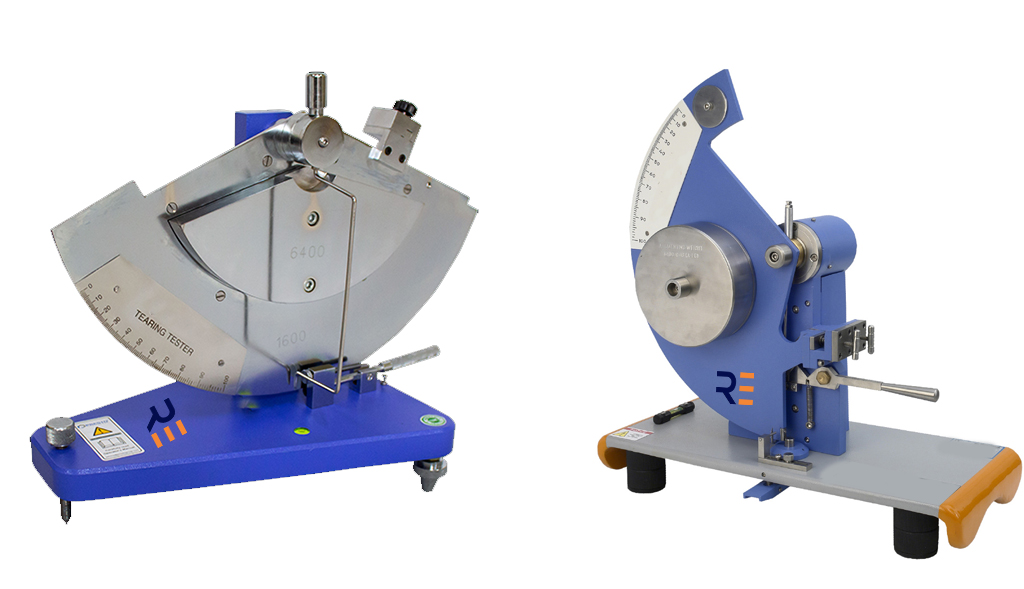
This instrument is used for measuring the resistance against tearing of paper, board, plastic films and other similar materials. An initial cut is made in a set of test piece, which are then torn through a given distance.
The work done in the test piece is measured as the loss in potential energy of a pendulum which is free to swing on it horizontal axis provided with single pendulum. A calibrated scale indicates the mean tearing force.
EXTRA OPTIONAL:
Interchangeable pendulum for different range.
- 0-2000, (Extra Light)
- 0-8000, (Light, A)
- 0-16000 mN. (Medium, B)
- 0-32000 mN. (Heavy, C)
- Tearing sample cutter.
- Set of calibration weights.
SPECIFICATIONS :
Easy to operate and has high accuracy level ± 1% of readout value and reliability.
Adjustable base levelling screw.
Incision knife of hardened and ground spring steel.
Precision clamps with controlled jaws, made of stainless steel.
Extra light low friction. Pointer with friction lining of textile material. The complete pendulum is interchangeable.
Scale calibrated in mN/ gramforce.
SPECIMEN :
Height : 62 mm ± 0.2 mm.
Length : 50 ± 2.0 mm
INTERCHANGEABLE PENDULUMS HAVING THE FOLLOWING CAPACITIES:
Calibration Check Weights. Manual Tearing Sample cutter.
For preparation of tearing test specimen.
APPLICABLE STANDARDS: TAPPI T-414 , APPITA P-400, SCAN P-11, ASTM D 689, D 751, D 1424, IS:1060 (Part-I),
| Extra Light | Light Pend. | Medium Pend. | Heavy C |
| A/4 | A Type | B Type | C Type |
| 2000 mN | 8000 mN | 16000 mN 1600 (gf) | 32000 mN |
Shipping Data :
Net Weight. Gross weight.
Ordering Data :
Model No. Voltage.
DETAILS :
Enjoy the reliability of the Electronic Tearing Resistance Tester the Tear Tester offers the convenience of a user-friendly instrument that gives you more information quicker and easier than other devices. This tear tester makes tear testing a very easy test to perform.
With over 16 years’ experience as the original manufacturer of the elmendorf design, JSR tear testers are recognized as the standard worldwide. Based on the classic design, the combines proven reliability with advanced electronics to provide complete control over your tests and deliver an unparalleled range and quality of data.
Adheres to: ASTM D295, ASTM D752, ASTM D4247, ASTM D1424, ASTM D1922 ,TAPPI T414, T496, ISO 1974, ISO 9290.
**You want your test results to fall between 20% and 80% of your pendulum capacity. For example, if you are using a 1600 gram pendulum, you should expect to get tear results between 1280 grams and 320 grams** The electronic model provides several enhancements over the mechanical model. All test results and statistics are calculated automatically and displayed on the LCD screen. An RS-232 port enables test results to be transmitted to a computer & then printer. Repeatability and precision are increased as pendulum movement is monitored by a digital encoder.
Ergonomically designed for ease of operation and conservation of laboratory space, the incorporates both mechanics and electronics into a single footprint design.
Other standard features of the electronic model include air-actuated pendulum release and sample clamps, microcomputer-assisted pendulum balancing and a membrane switch display panel.
The control panel provides one-touch clamping and test capabilities. Other functions include data entry of sample information such as sample ID, thickness, basis weight, sample direction and number of plies being torn. The “Units” key enables the simple conguration of result units.
FEATURES :
- Digital encoder ensures accurate results .
- Electronic balancing of pendulums.
- Congurable display shows test information and software menus.
- User-friendly, one-touch software.
- Quick capacity change with augmenting weights.
- One-touch pneumatic clamping and pendulum release available.
Industry standards:
- ASTM D295, D752, D1424, D1922,
- D5734
- TAPPI T414, T496
- BS 4253, 4468
- CPPA D.9
- DIN 53862, 53128
- ISO 1974, 9290
- EN 21974
- SCAN P11
OPERATION :
The operation of the JSR Tear is easy-simply secure the sample in the two clamps, make an initial tear with the attached blade and release the pendulum. The tearing resistance of the material is measured via the transference of the potential energy stored in the raised pendulum to kinetic energy. A portion of this energy is absorbed during the tearing of the sample and is used as a measure of the materials resistance to a continuing tear. The energy required to tear the sample is reported as a percentage of the pendulum capacity or force.
FAST, FLEXIBLE SOFTWARE :
The JSR Tear’s standard menu-driven software provides total control over test parameters and reports test data seconds after test completion.
- Test results include tear strength, tear per ply, average tear strength and tear index.
- Quickly enter sample data – thickness, basis weight, sample ID, sample direction.
- Congurable display – test parameters, results and reports.
- Obtain results as percent of pendulum capacity, grams, pounds or millinewtons.
- Calculated statistics – average, high, low, standard deviation, range & variance.
- Congurable reports.
- Provision to delete and restore test results data acquisition.
ADDITIONAL INFORMATION :
Model Name JSR 405 B
Industry Corrugated, Cardboard, Non wovens, Packaging, Paper, Paperboard, Plastic Film, Pulp, Textiles.
Capacity 200, 400, 800, 1600, 3200 & 6400 gms.
Net Weight 15.2 kg (33.6 lbs).
Dimensions 483 x 398 x 578 mm [19 x 15.66 x 23 in].
Accuracy 0.2% of pendulum capacity.
Testing Property Tear.
List of Standards ASTM D295, ASTM D752, ASTM D4247, ASTM D1424, ASTM D1922, TAPPI T414, TAPPI T496, ISO 1974, ISO 9290.
